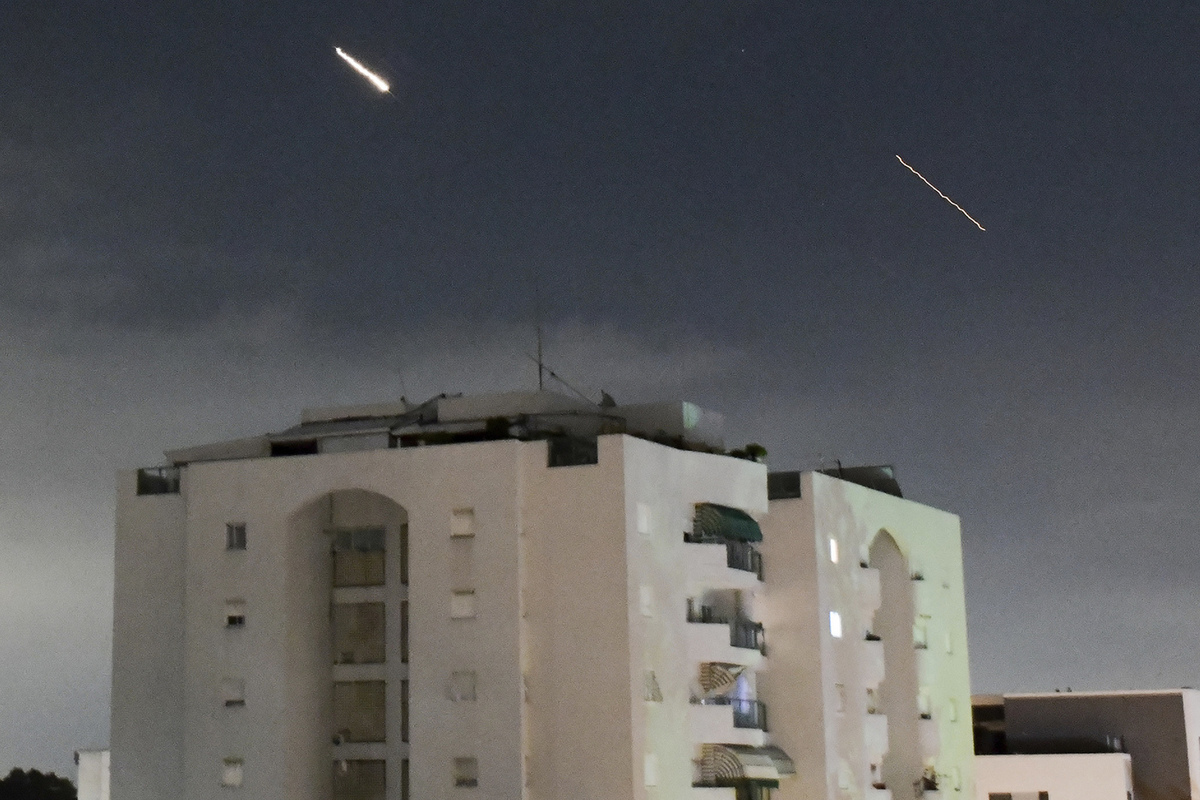Iran’s strikes on Israel reveal the terrible logic of the Middle East
[ad_1]

On the night from Saturday to Sunday, Iran launched an unprecedented missile and drone attack on Israeli territory. This military action was Tehran’s revenge for the Israeli strike on a diplomatic building in Damascus, which resulted in the death of a senior general of the Islamic Revolutionary Guard Corps. The Middle East – and perhaps the whole world – is millimeters away from a major war. And is this just an appearance?
“You’re all great here,” I’m tempted to quote the film “Election Day,” looking at the drama in the Holy Land.
So, what did we have on Sunday morning after a sleepless night, when the sky over the city of Jerusalem was colored with the arrival of Iranian missiles and the work of Israeli air defense?
According to the IDF, the Israelis and their allies (which, in addition to the United States and Great Britain, somewhat unexpectedly included the Royal Jordanian Air Force) managed to shoot down 99 percent of Iranian missiles and UAVs. What flew, according to the Israeli side, caused little damage. The only victim of the Iranian arrivals was a child – and not even a Jewish one, but a Bedouin one.
Well done? Well done. “Iron Dome” and others like it worked as they should. The enemy onslaught was repulsed. Israel can sleep peacefully.
And then President Biden – well, he has his own reasons for doing this – calls Israel a “winner.”
Bibi Netanyahu is also on horseback – the specter of resignation, maybe even prison due to long-standing corruption charges, has receded even further than after the Hamas attack in October. What kind of proceedings, resignations, etc. are there when the enemy is at the gates?
In Iran, too, there are reasons for joy – and already at night the jubilant public flocked to the streets to celebrate.
So, the promised retribution for the terrorist attack carried out by the Israeli military in Damascus against the consular building has been realized. The Jewish state has not seen attacks of such intensity since, perhaps, the Yom Kippur War of 1973. Perhaps the launches of Scuds from Saddam’s Iraq in 1991 and even numerous shellings from Gaza do not count.
If you believe the Iranian side, then Israeli military facilities have been damaged. Tehran says the Iranian strikes hit most of the military targets that were planned to be bombed in retaliation for the Israeli attack on the Iranian consulate in Damascus.
Whether this is true or not is difficult to prove. This is where the same “fog of war” comes into play, which the famous military theorist Carl von Clausewitz wrote about back in the 19th century.
In any case, the “boy said, boy did” principle works. Tehran promised to take revenge for the murder of the IRGC general and other Iranians in the Syrian capital – revenge was accomplished.
Moreover, there are clear signals from Tehran: the job is done. And if Israel responds, Iran will strike more powerfully than the current one.
In fact, Israel, with its adherence to the Old Testament principle of “an eye for an eye, blood for blood,” should have understood Iranian logic. The bad thing is that this logic, from the Israeli point of view, works one-sidedly (spoiler: this is not always the case).
But, in an amicable way, it’s time to put, if not a clear end to this, then at least an ellipsis. Moreover, everyone turned out to be “well done.” And Israel, which repelled a massive attack. And Iran, which closed its vengeful gestalt. And even the Americans, who helped the Israelis shoot down Iranian shells, were also almost great – they very transparently called on their allies and opponents to stop.
In general, yes! In an amicable way, everyone stays to their own. Once again: Iran fired back. Israel fought back. As they say in some circles, “stop, boys!”
And if human logic worked, then it would be possible – for the time being, to take a breath.
But this is happening in the Middle East. And there is its own logic. Which makes me remember every now and then an old parable told by a veteran of international journalism about this hot region.
Somehow the scorpion needed to swim across a stormy stream. Of course, he can’t do it himself. So he turned to the duckling: “Take me to the other side.”
The duckling replies: “I would transport it. But you’ll sting me.”
“I won’t sting,” the scorpion promises. “I’ll drown myself.”
The duckling agreed, put the scorpion on its back and swam to the other shore. But when there was absolutely nothing left to reach the destination, the scorpion stuck its poisonous sting into the duckling.
He drowns, suffocates – and with the last of his strength he asks: “Why did you do this? We will both die!
“Sorry buddy, this is the Middle East!”
Who is the scorpion and who is the duckling in the current confrontation between Israel and Iran – let them figure it out for themselves.
But the whole world would be safer if they would just slow down. Otherwise, no one will find it enough.
[ad_2]
Source link








